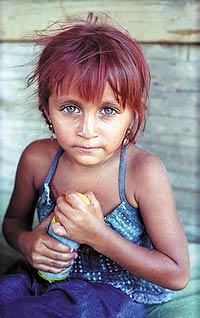 A young Romani resident of the Via Salone Camp on the outskirts of Rome, Italy. (Stefano Montesi photo, courtesy of the ERRC) |
The Roma, commonly referred to as Gypsies, are a stateless people who face discrimination and racially motivated violence in virtually every country in which they reside. The Roma are a population defined by either Rom bloodlines or a Romani-derivative language. The origins of the Roma people and their language have been traced to Northern India over a thousand years ago. The reason for the initial migration from India remains a mystery, and little is known of their ancient history.
Currently, there are about 12 million Roma throughout Eastern and Central Europe; however, no one is quite sure of the numbers because most governments do not include Roma in their census and many Roma lie about their heritage when directly asked. Almost all of the Romani experience some form of discrimination. For example, many governments deny the Roma access to education, employment, voting, housing, travel rights, and refuse to recognize them as citizens. Along with this institutionalized racism, the Roma suffer from a lack of rights across all of Europe such as privacy, asylum, freedom of assembly, and freedom of movement. Systemic apathy in domestic law enforcement and national courts compounds the Roma's marginalization and alienation.
Many Central and Eastern European states have anti-discrimination laws, but they are rarely enforced. States such as Romania, the Ukraine, and Albania are reluctant to expend their limited resources to protect the Roma because many governments do not view the Roma as citizens, but as unwelcome interlopers. To combat this, the European Roma Rights Center (ERRC) in Budapest, Hungary, advances Roma rights by confronting legal issues that affect the Roma before domestic and international courts such as the European Court of Human Rights and the United Nations Human Rights Committee. The ERRC's legal strategy includes impact litigation, where one ruling by a sufficiently powerful court could change the lives of thousands of Roma. Another tactic is direct lobbying to national parliaments or international bodies. For example, the Council of Europe recently granted the ERRC consultative status, which allows the ERRC to promote policies that better protect the Roma.
In addition to submitting country and situation reports to U.N. bodies to help publicize the plight of the Roma, the ERRC also publishes the Roma Rights Quarterly, a compendium of thematic and research papers analyzing the Roma's legal and political situation. Along with the inherit value of exposing systematic human rights violations in order to "shame" countries into changing policy, the ERRC's work enables other activists to make informed decisions and to assist in developing durable solutions for Europe's most underprivileged ethnic group.
This summer I will assist the ERRC in advocating for Roma rights before national courts, the European Court of Human Rights (ECHR), and diverse U.N. bodies. I will also help submit country reports to international bodies such as the U.N. Human Rights Committee, the U.N. Committee on the Elimination of Racial Discrimination, the European Union, and the Council of Europe.
The case of "Nachova v. Bulgaria" is an example of what I'll be working on. Two unarmed Romani men were shot by Bulgarian soldiers. The Bulgarian courts found the shooting to be an appropriate use of lethal force, even though the victims took no aggressive action and were not considered dangerous. On February 26 of this year, the ECHR for the first time in its history found that the guarantee against racial discrimination (Article 14 of the European Convention for the Protection of Human Rights and Fundamental Freedoms), taken together with the right to life (Article 2 of the same document) had been violated in this case. The ruling requires member states to investigate police and judicial actions that may have been motivated by racism.
My project will provide legal assistance in similar cases, and field monitoring to ensure that Contracting States respect "Nachova" and similar rulings.
— Mike
Mike Burstein is a 2004 Summer Fellow of UC Berkeley's Human Rights Center.






 The Roma in Hungary: Enforcing the human rights
of Europe's most underprivileged ethnic group
The Roma in Hungary: Enforcing the human rights
of Europe's most underprivileged ethnic group